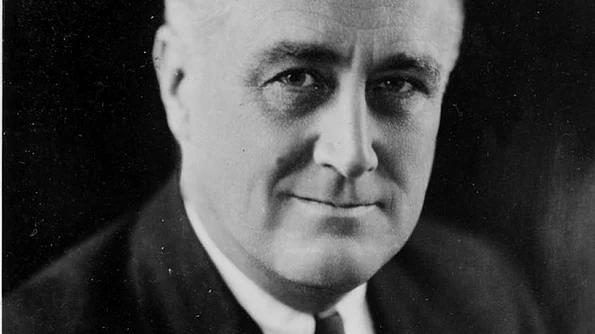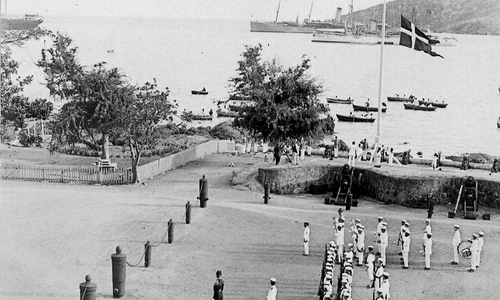
How did Franklin Roosevelt perceive Nazi Germany?
We all know – or at least think we know or we are still trying to learn about – how Hitler perceived the world, yet did we stop to wonder how Franklin Roosevelt saw it? Or more particularly, what kind of image did he have about Nazi Germany that he decided it was a “bandit nation”, so that Washington had to effectively take part in its demise, regardless of the American neutrality and isolation foreign policy?
Even before he became President, Franklin Roosevelt was very much worried by Germany’s new leaders and the National Socialist regime they were implementing. Since the beginning, FDR realized that Nazism was completely opposed to the basic Democratic principles and even in 1933, he suspected that Germany’s foreign policy might lead to or that they clearly sought war. Yet, the historian Adam Tooze observed that the US recovered too late, in order to be able to have a pivot role in the International Relations system. In other words, it was too late for the US to stop the Reich’s ascension when it finally reached a moment where it had the power to do so.
Roosevelt and some of his Administration were convinced that it was high time the US changed its neutrality policy. Until 1939, they made an effort to get this message across to the American public, yet it soon proved to be a far more difficult task than they bargained for. The majority of Americans were convinced that their country should not be involved in any way with selling arms or military equipment to no country, not even to the ex-WW1 allies, because they thought that it led to America’s engagement in the conflict. Also, the majority of them believed in an axiom which regarded their country as strategically invulnerable, since there were two oceans to protect them from either Europe or Asia. Yet, on December 7th, 1941, this belief was shattered to pieces.

However, with this mindset, the Congress did not alter the neutrality policy to one favourable to the UK or France, but instead it enforced it in 1935 and 1936. Thus, legally, there was not much left to do for FDR and his Administration, yet they could innovate whereas declarations were concerned and this way, make the leaders of the world question their intentions and make their own people doubt their security.
Involvement in war aside, the Americans and their President were united in the idea that Berlin’s anti-Semitic, anti-Christian and economic policies were unacceptable and that the Administration should do its best to delimitate itself from them. The State Secretary Cordell Hull resumed the American opinion on the situation in Germany that Hitler’s actions of rebuilding Germany were an effort to make it more similar to the Fuehrer. Hull elaborated on it by saying that his image was created on the basis of Prussian ideology of superiority and a militant, militaristic and Spartan psychology.
Initially, in 1933 – 1936, FDR perceived the menace that Germany was, yet he thought that no American expeditionary force should be sent over the Atlantic in another confrontation where the US had no input. Or, in his words, Roosevelt was trying not to pull Europe's chestnuts out of the fire.However, in 1938 – 1939 he understood this no-involvement policy could not be respected under the given circumstances. Yet, he won his second term by stating clearly that“your boys are not going to be sent into any foreign wars”, but always with the exception of “in case of attack.”Also, he ensured his audience that“our national policy is not directed toward war, its sole purpose is to keep war away from our country and our people.”[1]
However, "as a result of world events in the last few years, and as a result of scientific advancement in waging war, the whole orientation of this country in relation to the continent on which we live—in other words from Canada to Tierra del Fuego— . . . has had to be changed . . . Any possible attack has been brought infinitely closer than it was five years or 20 years or 50 years ago."[2]
The American President went even further on October 5th, 1937, when he proclaimed that this epidemic of anarchy and terror created by the Axis should be quarantined. In his book, Backdoor to War. The Roosevelt Foreign Policy 1933 – 1941, Charles Callan Tansill suggests that FDR had at the time noplan or intent to createa collective security scheme, yet it proves that he and his Administration were seeking a plan which would enable them to participate in the system, in order to maintain peace. Thus, Washington decided to break the connection London – Berlin which seemed to exclude the US from an Open Door policy in Europe. FDR’s and the American political elites’ constant mistrust towards the British Prime Minister, Neville Chamberlain sent them decidedly into this direction. So, it seemed quite simple:the more the UK was attracted towards the US with real and viable promises, even a treaty, the more it would sever the German connection.

At the time, it was not clear that the Axis was just a propagandistic construct with fundamental flaws which did not enable it to actually function like a real alliance. However, Roosevelt saw them as bandit nations which wanted to conquer the world and decided that the Reich was the bigger menace, since it could actually threaten the US and the whole world, whereas Japan did not have the means to do so. Tokyo could only affect a part of the system or so Roosevelt thought. After he realized this, the Administration decidedly embarked the US on a policy of deterrence against Germany and Japan, yet the main focus was to be Berlin. Maybe if the Reich stopped pursuing its aggressive objectives, Japan would retreat too, not to mention Italy which was not even prepared for war.
Therefore, after the creation of the US Atlantic Squadron, Washington agreed to send two cruisers to the British ports in September 1938, just after the Munich Conference. It was a small step, but very important whereas the US was concerned. Besides its Naval Bill from May 1938, it was one of the first actions which clearly demonstrated that the US favoured the Democracies over the Dictatorships. Yet, Hitler did not quite understand that if the American vital interests are put to the test, Washington would not claim its neutrality policy so as not to intervene. Moreover, he thought that he could manipulate his perceived enemy countries to enter the war at times he deemed necessary. This, by all means, was nothing else but a utopia. Roosevelt would not stand idle so as to expect Germany to finish its rearming policy. Berlin’s military efforts were outdone by the Royal Navy and the American Naval Bill of 1938.
However, these were just law and declarations which seemingly could not be translated into actions, if the Congress did not allow the US to be involved into wars. So, the real problem was people’s mindset and the Administration set up propagandistic campaigns to change that, yet they could only be swayed after both the politicians and the public decided that “the experience of the past two years has proven beyond doubt that no nation can appease Nazis. No man can tame a tiger into a kitten by stroking it. There can be no appeasement with ruthlessness. There can be no reasoning with an incendiary bomb. We know now that a nation can have peace with the Nazis only at the price of total surrender.”[3]Yet, in the end, it took the Pearl Harbour attack for the US to enter the actual war, however, the American people were already rallying behind their President and his idea that their country should be an active actor in the International Relations system.
All in all, although FDR did finally manage to convey his message to the people who elected them that Germany posed indeed a danger to the US, he could not reconcile their wishes:70% of the American people were against their country being involved in any kind of war and at the same time 70% were for winning over Hitler by all means possible, but were at the core against military action.
So, in the end, the Reich became America’s biggest opponent, since it defied the very idea of democracy and peace. Not surprisingly, FDR and Hitler became almost personal enemies since they fought with the same idealistic zeal for their principles. Also, their countries were engaged in a conflict for the position of the world’s hegemon, the only difference was that the US aimed to bring a peaceful change, to propose a collective security system, while the Reich had violent and aggressive objectives derived from an ideology which preached superiority of the German race, but also an inevitable war of survival.
[1]Steven Casey, Cautious Crusade:Franklin D. Roosevelt, American Public Opinion and the War Against Nazi Germany, Oxford University Press, New York, USA, 2001, p. 38
[2]Robert Dallek, Franklin D. Roosevelt and American Foreign Policy, 1932 – 1945, With a New Afterword, Oxford University Press, New York, USA, 1995, p. 175
[3]Steven Casey, op. cit., p. 38















